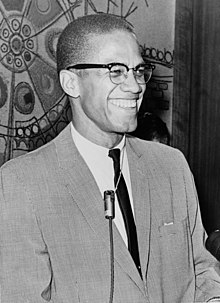Malcolm X (born Malcolm Little; May 19, 1925 – February 21, 1965) was an African American Muslim minister and human rights activist who was a popular figure during the civil rights movement. He is best known for his time spent as a vocal spokesman for the Nation of Islam.
Malcolm spent his adolescence living in a series of foster homes or with relatives after his father's death and his mother's hospitalization. He engaged in several illicit activities, eventually being sentenced to 10 years in prison in 1946 for larceny and breaking and entering. In prison, he joined the Nation of Islam, adopted the name Malcolm X (to symbolize his unknown African ancestral surname), and quickly became one of the organization's most influential leaders after being paroled in 1952. Malcolm X then served as the public face of the organization for a dozen years, where he advocated for black empowerment, black supremacy, and the separation of black and white Americans, and publicly criticized the mainstream civil rights movement for its emphasis on nonviolence and racial integration. Malcolm X also expressed pride in some of the Nation's social welfare achievements, namely its free drug rehabilitation program. Throughout his life beginning in the 1950s, Malcolm X endured surveillance from the Federal Bureau of Investigation (FBI) for the Nation's supposed links to communism.
In the 1960s, Malcolm X began to grow disillusioned with the Nation of Islam, as well as with its leader Elijah Muhammad. He subsequently embraced Sunni Islam and the civil rights movement after completing the Hajj to Mecca, and became known as el-Hajj Malik el-Shabazz. After a brief period of travel across Africa, he publicly renounced the Nation of Islam and founded the Islamic Muslim Mosque, Inc. (MMI) and the Pan-African Organization of Afro-American Unity (OAAU). Throughout 1964, his conflict with the Nation of Islam intensified, and he was repeatedly sent death threats. On February 21, 1965, he was assassinated in New York City. Three Nation members were charged with the murder and given indeterminate life sentences. Speculation about the assassination and whether it was conceived or aided by leading or additional members of the Nation, or with law enforcement agencies, have persisted for decades after the shooting.
A controversial figure accused of preaching racism and violence, Malcolm X is also a widely celebrated figure within African-American and Muslim American communities for his pursuit of racial justice. He was posthumously honored with Malcolm X Day, on which he is commemorated in various cities across the United States. Hundreds of streets and schools in the U.S. have been renamed in his honor, while the Audubon Ballroom, the site of his assassination, was partly redeveloped in 2005 to accommodate the Malcolm X and Dr. Betty Shabazz Memorial and Educational Center.
Last Updated: June 9, 2021


























